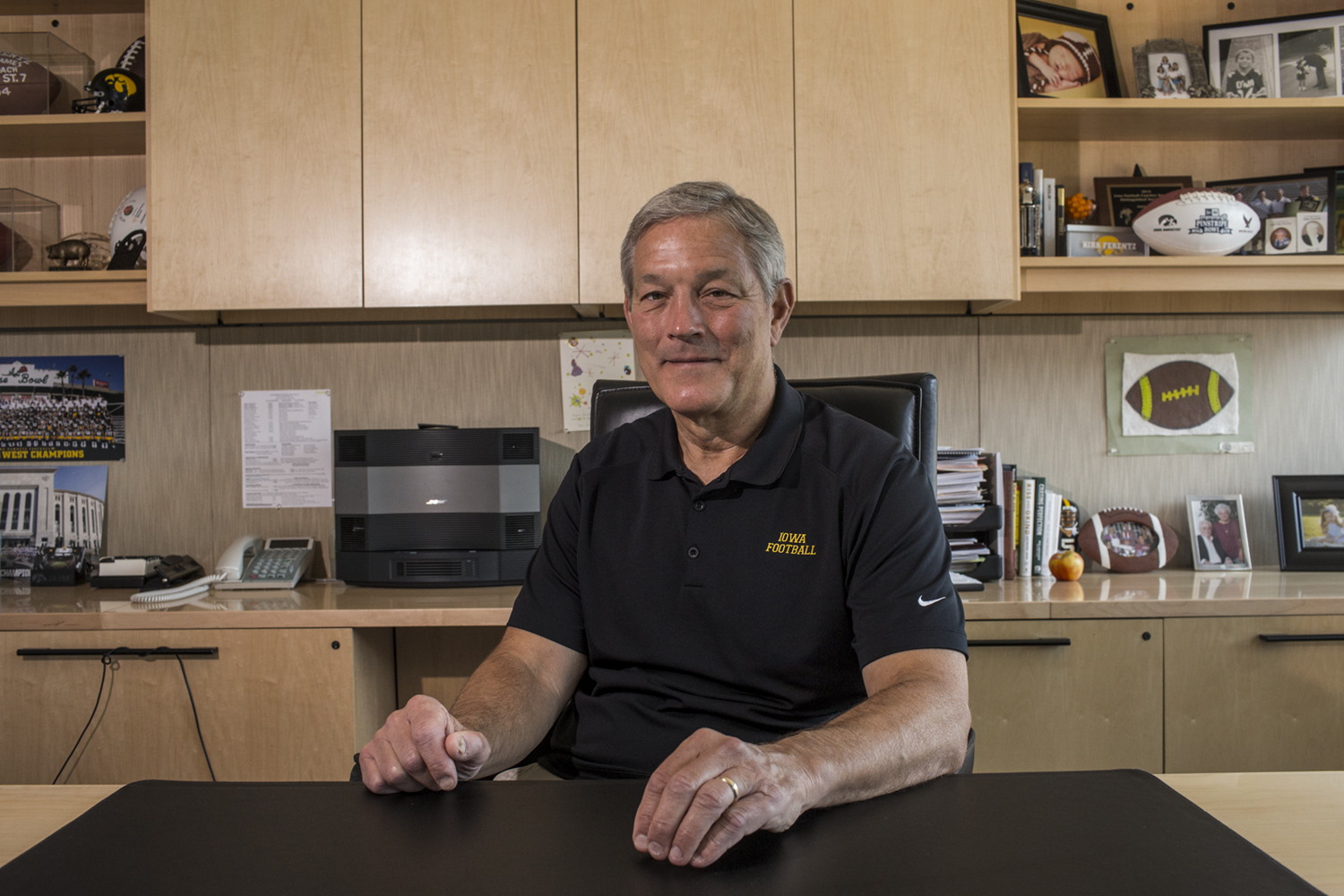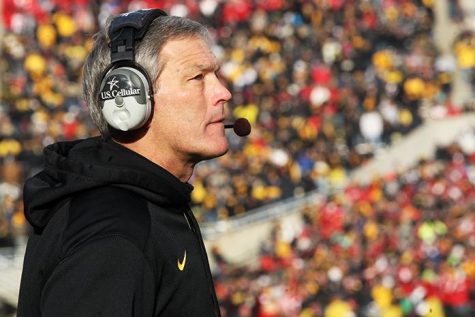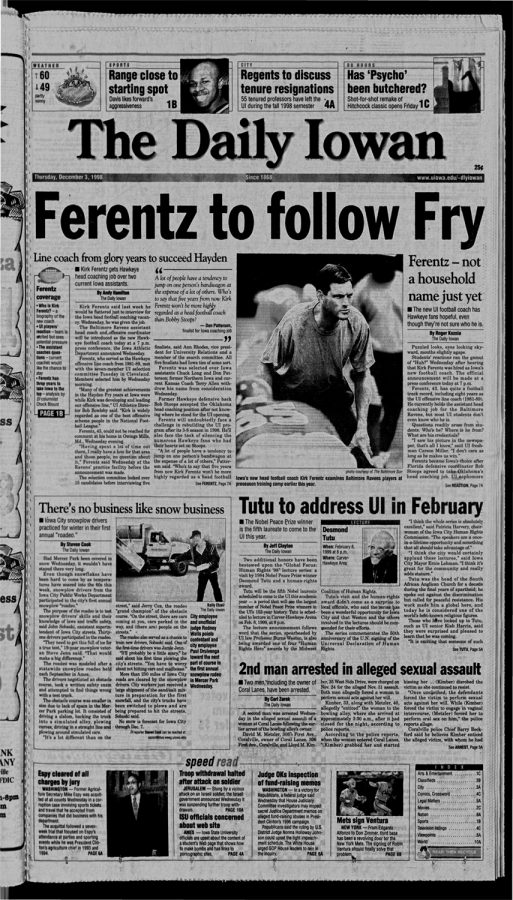Closing in on win No. 144: Kirk Ferentz approaches history
Kirk Ferentz is one victory away from the school record for most wins in Hawkeye history, but he’s more than just a coach.
August 31, 2018
With a win on Saturday, Iowa football head coach Kirk Ferentz will become the program’s coach with the most victories in Hawkeye history.
Ferentz sits at 143 wins, the same number that former coach Hayden Fry rolled up in his Hawkeye career. Only four Big Ten coaches can claim more wins than Ferentz and Fry — Amos Alonzo Stagg, Woody Hayes, Bo Schembechler, and Joe Paterno. All of these coaches, except Ferentz, are in the College Football Hall of Fame.
The 20-year coach for Iowa has placed himself in the presence of legendary company, and a win against Northern Illinois would cement his legacy among the all-time great coaches in the Big Ten and college-football history.
You’d think that if win No. 144 becomes reality, Ferentz might have some big plans.
“I’ll probably go home, sit around with my family, and knock out a Ben and Jerry’s. Maybe I’ll have two that night, and get up, and go back to work the next morning,” Ferentz told The Daily Iowan during a one-on-one interview this offseason. “My life is really boring after a game. I do nothing, and I like it that way.”
That sort of business-as-usual mantra is a staple of Ferentz’s personality and coaching style. If you ask him about the record, he doesn’t like talking about it. The veteran coach goes about his work, a person who shies away from the spotlight, and current and former Hawkeyes alike echo that.
“His characteristics as a person match up pretty well with what we all like to think of ourselves as Iowans, in terms of hardworking, and humble, and respectful — all those things you think of Midwestern qualities, characteristics,” said Nate Kaeding, an All-American Hawkeye kicker from 2000-03.
It’s the grit and grind that has stuck with him since his days at UConn and resonates today, in those he works alongside of and the athletes he coaches.
“It wasn’t something he learned at Iowa, it was something he brought with him,” said Bill Snyder, the longtime Kansas State head coach who worked with Ferentz in the 1980s as Iowa’s offensive coordinator. “That was one of the reasons I was interested in having him. He was a guy who rolled up his sleeves and went to work.”
First Iowa stint
Prior to the 1981 season, Iowa head coach Hayden Fry tasked Snyder with finding the Hawkeyes’ next offensive-line coach.
He got along well with the players, the players had great respect for him and wanted to do right for him, and not just on the field.
— Bill Snyder, former offensive coordinator
Snyder went to Pitt offensive-line coach Joe Moore, one of the nation’s biggest offensive-line gurus, and his search didn’t take long. Moore pointed Snyder to a man he coached at Upper St. Clair High School in 1972 and worked alongside with at Pitt in 1980.
“Joe said, ‘The guy you want is Kirk Ferentz,’ ” Snyder told the DI. “We invited Kirk to visit, and Hayden liked him and offered him the job.”
Now, 37 years after his first coaching gig at Iowa, Ferentz has made a name for himself. That’s obvious. But his success would not likely have occurred without Fry’s tutelage.
Under Fry’s leadership, Iowa went to eight-straight bowl games from 1981-88. Two of those trips were to Pasadena, California, for the Rose Bowl.
Ferentz returns to Iowa City
The 1990s featured more success: a 1991 trip to Pasadena, a 10-1 season, and six bowl appearances. But in 1998, Fry’s final season at Iowa, the Hawkeyes finished 3-8 — the worst season since he took over the program. On Nov, 22, 1998, he announced his retirement.
Ferentz says he can still remember that moment.
“I’ll never forget that [day] because you never think your dad is going to die, but the reality is it’s going to happen,” Ferentz said. “I don’t think any of us ever thought Coach Fry would retire.”
By this time, Ferentz had been away from the Hawkeyes for nine years. He left his offensive-line gig in Kinnick to become the head coach at Maine for two seasons before making the leap to the NFL, working as the offensive-line coach for Cleveland and then Baltimore after the Browns relocated and became the Ravens.
While Ferentz was working as the Ravens’ O-line coach, sitting at his desk constructing a game plan against the Indianapolis Colts, Iowa held a press conference for Fry.
“Ozzie Newsome came in and said, ‘Hey, you should come down to my office, we have the press conference on. You might want to watch.’ And it was Coach Fry’s press conference,” Ferentz said. “It was one of those moments you have, and I was like, ‘Jeez, I can’t believe Iowa is going to have a new coach.’ ”
Ferentz wasn’t dying to become a head coach, and in fact, returning to college football wasn’t even on his radar. Looking back, he said, the Iowa head-coaching gig was the only opportunity worthy of leaving the NFL, and he and wife Mary had a strong Iowa connection — a main reason that he opted to return to Iowa City.
Not even 24 hours after meeting with the university’s selection committee, UI Athletics Director Bob Bowlsby tabbed Ferentz as the Hawkeyes’ next head coach, on Dec. 2, 1998.
“Many of the greatest achievements in the Hayden Fry years at Iowa were while Kirk was developing and leading our offensive line,” Bowlsby said at the time. “Kirk is widely regarded as one of the best offensive-scheme people in the National Football League.”
Rebuilding the Iowa program
Flash back to Ferentz’s first season in 1999, and not many — if any — could have seen it coming. Iowa kicked things off the year with a 35-point loss to Nebraska, followed by a loss to in-state rival Iowa State. A “State of Embarrassment” headline ran across the DI sports page.
Iowa fans, many of whom had wanted the program to hire former Hawkeye player and assistant coach Bob Stoops, were frustrated to the nth degree. The DI even wrote a weekly “Stoops Watch” to see how Hawkeye fans’ first choice was doing at Oklahoma.
Ferentz’s first win in 1999 came against Northern Illinois — Iowa’s opponent on Saturday — 24-0. But the winning stopped there. Iowa finished an abysmal 1-10 that year and averaged 14.7 points per game, ranking 105th out of 114 Division-1 football programs.
One of the 1999 losses included the Wisconsin game. In Madison, the Badgers pounded the Hawkeyes in a 38-point victory to clinch the Big Ten title incite a sea of red as fans to storm the field in celebration.
“That was not a high point, but one positive was I told our guys then, that’s what we’re striving for,” Ferentz said. “That’s what we want Kinnick to be like.”
Victories were still hard to come by in Year 2. That season, Ferentz and the Hawkeyes lost their first five games, including a 20-point loss to Snyder’s Kansas State Wildcats in the Hawkeyes’ opening game.
Ferentz’s first Big Ten win came against Michigan State on Oct. 7 of that season; however, the Hawkeyes then suffered three-straight losses and wound up staring at a 1-8 record.
But then, Iowa won two of its final three games. Iowa’s final victory of 2000 came against No. 12 Northwestern.
The Hawkeyes had improved in 2000 — not in leaps and bounds, but the Iowa program wasn’t a laughingstock.
“There’s a moment where I thought it might not work. We had a rough beginning; the first two years weren’t easy,” Ferentz said. “There was one moment where I went home one night, I allowed myself one night, it was a Wednesday, to think maybe this isn’t going to go. We had an unfortunate injury in practice that day in a place where we couldn’t afford it. And it was like, you know, maybe this isn’t meant to be. But the next morning, that thought was completely washed out.”
Taking over a team after a great Hayden Fry legacy — they were not great, but he turned the ship around quickly, and year in and year out, competed for Big Ten [Championships] … he’ll have a statue alongside Hayden Fry one day.
— Erik Jensen, former tight end
It was back to work, and this time, the Hawkeyes enjoyed some well-earned success.
Ferentz’s third year at Iowa featured the Hawkeyes’ first bowl victory in five seasons, and from there, the Black and Gold returned to the relevancy it had enjoyed under Fry.
Iowa hadn’t won a bowl game since 1996, and after a five-year trophy hiatus, Ferentz and Company brought an Alamo Bowl trophy back to the football complex, marking the start of the coach’s winning ways.
Setting the standard
From 2002-04, Ferentz had three-straight seasons with at least 10 wins. During that span, the Hawkeyes had fewer losses (7) than they did in Ferentz’s first season.
Ferentz’s Hawkeyes won two Big Ten titles during that time, including a conference championship run in 2002 that concluded with an unblemished 8-0 Big-Ten record. From the 2002 season to 2006-11, the Hawkeyes only missed the postseason once.
“Coach Fry pretty much laid the groundwork for the University of Iowa, especially the football program, but I think Coach Ferentz has taken it to another level, locally and nationally,” said Drew Tate, a Hawkeye quarterback from 2003-06. “Without a doubt, [there] should be two statues of the [men].”
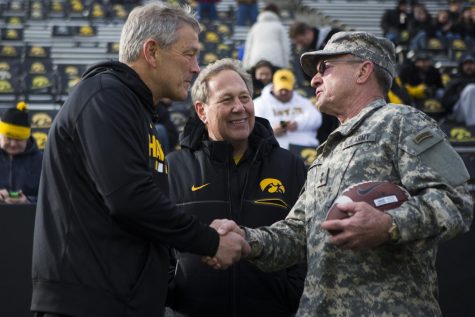
Since heading the program in 1999, Ferentz won a pair of Big Ten Championships, recorded five 10-win seasons, hauled his players to 15 bowl games, enjoyed an undefeated regular season in 2015, won the Big Ten’s Coach of the Year award four times, and produced 10 consensus All-Americans.
Above all, Ferentz has kept Iowa football competitive in his 20 years in command. Since that 3-9 season in 2000, he’s finished only two seasons with losing records, and that has not gone unnoticed by other programs.
“After he became the head coach, he had ample opportunities to leave the University of Iowa for maybe bigger pay or etc., etc., but always chose to stay because he loved the people of Iowa,” Snyder said. “He loved the program. He loved the community, loved the university. He had an immense loyalty to anyone and everyone who had any involvement with the university, Iowa City, or the football program.”
Ferentz has maintained his position in a world in which coaches are interchangeable. After all, Les Miles, who won a national championship with LSU in 2007, seemed almost untouchable, but he was fired in 2016 just four games into the season.
Coaches jump from team to team frequently as well: James Franklin from Vanderbilt to Penn State, Urban Meyer from Florida to Ohio State, Scott Frost from Central Florida to Nebraska, and P.J. Fleck from Western Michigan to Minnesota. During Ferentz’s time as the Hawkeyes’ head coach, other Big Ten programs have gone through 63 head coaches, an average of 4.85 per school.
“In this day and age, a lot of people, they’re jumping off to the next thing as soon as they can, or taking an NFL job or a bigger college-football job, whatever it may be,” Kaeding told the DI. “I think Coach Ferentz has found a profession that’s been rewarding for him and challenging for him. He’s created a much deeper, meaningful legacy catered by staying the course here at Iowa.”
Embracing the community
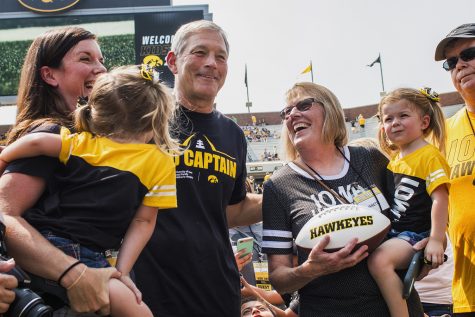
Iowa head coach Kirk Ferentz laughs with the Still family during Iowa Football Kid’s Day at Kinnick Stadium on Saturday, August 11, 2018. The 2018 Kid Captains met the Iowa football team and participated in a behind-the-scenes tour of Kinnick Stadium. Each child’s story will be featured throughout the 2018 Iowa football season.
Attempting to sum up one’s legacy can be challenging, especially factoring in all the variables. Winning is a major point in determining a coach’s legacy in any sport, but off-field actions speak volumes.
For Ferentz, that means giving back to the community that loves him.
In this past year alone, he donated $1 million to the UI Stead Family Children’s Hospital, and it’s clear that although most people believe the hospital and the football program are separate entities, they’re intertwined.
“You think about football, it’s a lot of bravado, it’s a tough game, physical, and you got to be mentally tough and all that stuff, but until you go over to the hospital, especially the Children’s Hospital, that’s where you really see what toughness is, optimism is, and great attitudes,” Ferentz said. “There’s just something about young people that is amazing, and when they’re challenged, it can bring the best out of them. It’s inspiring.”
In 2017, a new tradition took Iowa City, and eventually the nation, by storm. The Wave, in which fans, players, and coaches all turn to the Children’s Hospital following the conclusion of the first quarter and wave to the patients and their families, instantly found its niche with the Iowa program.
“The Wave is the all-time best tradition in sports. And the best part about it is it was just totally organic,” Ferentz said. “I’m the head coach right now, and we still do The Swarm. That was Coach Fry’s. Certainly, that’s my choice to keep that alive. At some point, there’s going to be a new head coach here, and The Swarm may or may not be a part of the routine, but I feel confident The Wave will never go away, no matter who’s coaching here. That’s going to be a part of Iowa football and Iowa [forever].”
Generating and maintaining those connections, football-related or not, is what Iowa football has been about under Ferentz.
A legacy deeper than football
The wins are good for something, yes, but according to most former players and coaches, it’s the human aspect of football that makes Ferentz stand out above all. The wins are “just a byproduct of him doing things the right way,” Kaeding said.
We would travel, and we would take charter flights, that the airlines would always write a letter or an email talking about how well and how professional we were compared to all the other teams that they chartered.
— Drew Tate, former quarterback
After graduating from Connecticut in 1978, Ferentz split time as the defensive coordinator at Worcestor Academy and as an English teacher, where his compassion for people and desire to educate blossomed.
“I found him to be, in a variety of circumstances, someone who cares an awful lot about people,” Kaeding said. “The human side of the game and what he does as a head coach, it’s a very admirable quality to have. He prioritizes the human element over the wins and losses.
“It’s sort of ironic: He’s setting the school record for wins, but he’s also this exemplary human being and leader of young men, and teacher, and those sort of things. Clearly, you have this very tangible thing in the number of wins, but he’s also a winner in terms of intangibles.”
For Miguel Merrick, who played safety for Iowa from 2004-06, Ferentz’s impact on him had nothing to do with football. It was about life after the game and building relationships.
“That’s one thing [he] always said, ‘If we can’t trust you on the football field, what are you going to do? Forget football, take football out of the equation. What are you doing to do when you have a family that depends on you?’ And that really resonated with me,” Merrick said. “Screw football; even the best guys only play football 15 years of their lives. You have the rest of your life to be a spouse and a dad much longer than your football career will be.”
In 1999 or 2000, not many people would have guessed Ferentz’s career at Iowa would have lasted this long.
But with Northern Illinois (his first Iowa win in 1999) coming to Kinnick to kick things off for the 2018 season, Ferentz is one victory away from doing something not many people ever thought anyone would accomplish.
He’s also one win away from a double portion of Ben and Jerry’s. Of course, then it’s back to work the next day.
